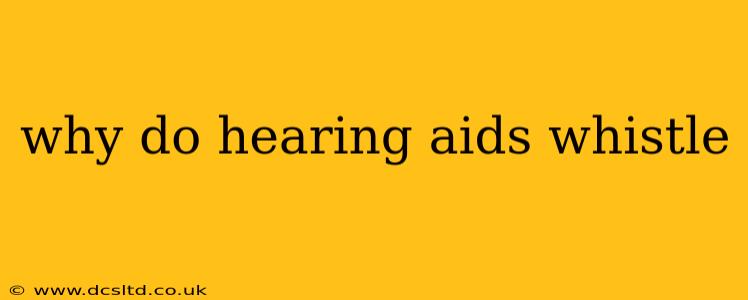Hearing aids are designed to amplify sound, making it easier for individuals with hearing loss to participate in conversations and enjoy the world around them. However, sometimes a high-pitched squeal or whistle can occur, a phenomenon known as feedback. This frustrating issue can significantly impact the user experience. Understanding why this happens is the first step towards finding a solution.
What Causes Hearing Aid Whistle?
The primary cause of hearing aid whistle is a positive feedback loop. This occurs when the amplified sound from the hearing aid escapes the ear canal and is picked up by the microphone, then amplified again, creating a continuous cycle of amplification. Imagine a microphone placed too close to a speaker – the sound from the speaker gets picked up by the microphone, amplified, and sent back to the speaker, leading to an incessant screech. The same principle applies to hearing aids.
Several factors contribute to this feedback loop:
- Poor fit: If the hearing aid doesn't fit snugly in the ear canal, sound can easily escape and be picked up by the microphone. This is a very common cause.
- Earwax buildup: Wax accumulating in the ear canal can create an imperfect seal, allowing sound to leak out.
- Damage to the earmold: Cracks or imperfections in the earmold (the custom-fitted part of the hearing aid that sits in the ear) can also compromise the seal.
- Improper insertion: If the hearing aid isn't inserted correctly, it won't create the necessary seal to prevent sound leakage.
- Clogged vents: Many hearing aids have vents to allow air to equalize pressure. If these vents become clogged with earwax or debris, the pressure build-up can contribute to feedback.
- Hearing aid settings: Incorrectly adjusted volume or other settings can also lead to feedback. The gain, or amplification level, if too high, increases the risk significantly.
- Environmental factors: In noisy environments, there’s a greater chance of sound bouncing around and being picked up by the microphone, even with a good fit.
How Can I Stop My Hearing Aid From Whistling?
Fortunately, there are several ways to address hearing aid whistle:
1. Check the Fit and Cleanliness
- Ensure proper insertion: Carefully insert your hearing aid, making sure it sits snugly in your ear canal.
- Clean your ears and the hearing aid: Remove any earwax buildup from your ears and thoroughly clean your hearing aid as directed by the manufacturer.
- Inspect the earmold: Examine your earmold for any cracks or damage. A damaged earmold will need to be replaced by an audiologist.
2. Adjust Hearing Aid Settings
- Lower the volume: Try reducing the volume to see if the whistling stops.
- Consult your audiologist: Your audiologist can adjust the settings of your hearing aid to minimize feedback. They have specialized software and training to manage these adjustments effectively. This is the most effective way to handle persistent feedback.
3. Use Feedback Reduction Technology
- Modern hearing aids often incorporate advanced feedback reduction technology: This technology uses sophisticated algorithms to identify and suppress feedback before it becomes audible. Discuss this feature with your audiologist.
4. Consider Different Hearing Aid Styles
- Different styles of hearing aids offer varying degrees of feedback resistance: Your audiologist can guide you in choosing a style that best suits your needs and minimizes the risk of feedback.
Why is My New Hearing Aid Whistling?
A new hearing aid whistling is often due to an improper fit or a need for fine-tuning of its settings. This is extremely common. Your audiologist should be contacted immediately. They will provide professional adjustments or confirm the hearing aid needs further assessment.
Why Does My Hearing Aid Whistle When I Talk?
Whistling when talking usually indicates a problem with the fit of the hearing aid or the amplification settings. The sound of your voice, amplified by the hearing aid, is escaping the ear canal and creating a feedback loop.
How Do I Fix a Whistling Hearing Aid Myself?
While you can attempt some basic troubleshooting like cleaning your ears and checking the fit, don't attempt major adjustments yourself. Improper adjustments can damage your hearing aid or worsen the problem. Always consult your audiologist for professional assistance.
By understanding the causes of hearing aid whistle and following these tips, you can significantly reduce the likelihood of this frustrating problem and enjoy the benefits of clear, amplified sound. Remember, regular check-ups with your audiologist are crucial for maintaining optimal hearing aid performance and addressing any issues that may arise.
